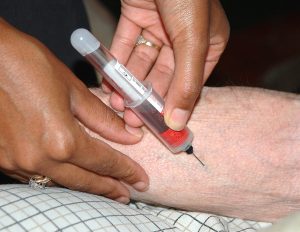Charlotte DWI Lawyer Brad Smith answers the question: “What am I obligated to do if I’ve been pulled for Drinking and Driving?”
If you were pulled over and a police officer believes that you were driving under the influence of alcohol, you may be asked to submit to chemical testing to detect the presence of alcohol in your system.
 If you refuse to submit to chemical testing after a lawful arrest for driving while impaired (DWI) in North Carolina, you can face license suspension and other penalties. That is because the state has a law of “implied consent,” which requires all motorists lawfully arrested for DWI to submit to chemical testing.
If you refuse to submit to chemical testing after a lawful arrest for driving while impaired (DWI) in North Carolina, you can face license suspension and other penalties. That is because the state has a law of “implied consent,” which requires all motorists lawfully arrested for DWI to submit to chemical testing.
It is advised to consult with a Charlotte criminal defense lawyer if you were arrested for DWI but do not want to submit to chemical testing. Your attorney may be able to help you prove that the police did not have probable cause to pull you over or arrest you.
What is the Law of Implied Consent in North Carolina?
Under North Carolina G.S. § 20-16.2, any person who operates a motor vehicle on a highway or roadway automatically gives their consent to a chemical test, a breath, blood, or urine test when charged with DWI or vehicular manslaughter (both “implied-consent offenses”).
However, under the law of implied consent in North Carolina, police officers must follow specific protocols when administering chemical tests. One of the requirements is that police must inform you of your rights to have an attorney and unbiased witness present to view the results of the test. If you are arrested for DWI in North Carolina, the arresting police officer must also read your Miranda Rights.
Can You Refuse to Take a DWI Test in North Carolina?
While the police officer cannot force you to take a chemical test, your refusal to take the test can result in civil or even criminal consequences.
- Civil consequences. Under the law of implied consent in North Carolina, your driver’s license will automatically be revoked for a year if you refuse a chemical test. You will face civil penalties even if you are not found guilty of DWI, or a judge subsequently dismisses the charges against you. Your license will remain revoked because it is a civil penalty. Though a criminal defense attorney may be able to help you find alternative resolutions depending on the circumstances.
- Criminal consequences. While you cannot face criminal charges for refusing to submit to chemical testing, your refusal can be used against you in your DWI case. However, the prosecution must still prove that you were impaired without the test.
Contact a Charlotte DWI Defense Lawyer
Your refusal to take a chemical test can impact the outcome of your DWI case in North Carolina. While you have a right to refuse to take the test, doing so can potentially result in serious civil and criminal consequences.
Regardless of whether you were arrested for DWI with or without a chemical test, you need to speak with an experienced local DWI defense lawyer. Our knowledgeable lawyers zealously defend clients against DWI charges and fight – in and out of court – to have the charges dismissed or reduced. Call our lawyers at Arnold & Smith, PLLC, at (704) 370-2828 to evaluate your options or fill out our contact form. Now taking cases throughout North Carolina with offices in Uptown Charlotte, Mooresville and Monroe.
The criminal defense attorneys at Arnold & Smith, PLLC make it their mission to zealously defend their clients on a wide range of criminal matters at both the state and federal levels. These matters may include any charge from traffic offenses; DWI/DUI; drug charges (from simple possession to possession with intent to distribute and trafficking); gun permit denials; weapons offenses; and property crimes (larceny, breaking and entering, robbery, fraud, embezzlement, white collar offenses); to sexually related offenses (indecent exposure; sexual assault, crimes against nature, removal from sex offender registry); and violent crimes (domestic violence; assault; manslaughter; homicide, murder). Other legal issues that Arnold & Smith, PLLC criminal clients may be facing include restraining orders, restraining order and probation violations, expungements; appeals; and immigration issues related to criminal charges. Our criminal defense attorneys are passionate about ensuring that individuals empower themselves by being informed about their constitutional rights, and stand at the ready to fight in the defense of those facing criminal charges.
Source:
https://www.ncleg.net/enactedlegislation/statutes/html/bysection/chapter_20/gs_20-16.2.html
Image Credit:
https://www.freeimages.com/photo/blood-test-1545982
See Our Related Video from our YouTube channel:
https://www.youtube.com/user/ArnoldSmithPLLC/videos
See Our Related Blog Posts:
Can You Face Criminal Charges for Letting a Drunk Person Drive While Intoxicated in North Carolina?
 Charlotte Criminal Lawyer Blog
Charlotte Criminal Lawyer Blog


